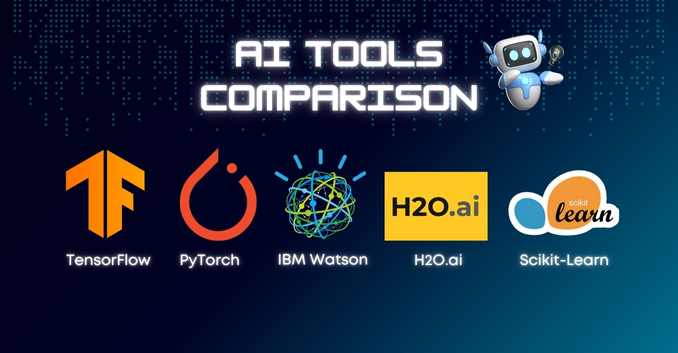
AI Tools Comparison: TensorFlow, PyTorch, Scikit-Learn, IBM Watson, and H2O.ai
Artificial intelligence (AI) is revolutionizing industries, helping organizations automate tasks and enhance decision-making. Choosing the right AI tool is crucial for scalability, ease of use, and project requirements. This blog compares top AI tools: TensorFlow, PyTorch, Scikit-Learn, IBM Watson, and H2O.ai.
Brief Overview of Each AI Tool
TensorFlow
Developed by Google, TensorFlow is known for deep learning and neural network applications, including image recognition and NLP. It offers high scalability and powerful computation capabilities.
PyTorch
Created by Facebook (Meta), PyTorch is widely used for research and prototyping due to its dynamic computation graph and user-friendly interface.
Scikit-Learn
A Python-based library for classical machine learning algorithms, ideal for data analysis, regression, and classification tasks. Best for beginners.
IBM Watson
IBM Watson specializes in NLP and enterprise-level analytics, widely used for chatbots and business intelligence applications.
H2O.ai
An open-source AI tool known for AutoML capabilities, making it ideal for businesses looking to implement AI with minimal coding.
Feature Comparison
| Feature | TensorFlow | PyTorch | Scikit-Learn | IBM Watson | H2O.ai |
|---|---|---|---|---|---|
| Ease of Use | Moderate | Easy | Easy | Easy | Moderate |
| Best For | Deep Learning | Research | ML Algorithms | NLP & Analytics | AutoML |
| Scalability | High | High | Moderate | Enterprise-Ready | High |
| Neural Net Support | Excellent | Excellent | Limited | Good | Good |
Pros and Cons of Each Tool
TensorFlow
Pros: Large ecosystem (TensorFlow Lite, TensorFlow.js). Cons: Steep learning curve for beginners.
PyTorch
Pros: Highly flexible and great for research. Cons: Slower production scaling compared to TensorFlow.
Scikit-Learn
Pros: Easy to use, beginner-friendly. Cons: Limited deep learning support.
IBM Watson
Pros: Enterprise-grade AI, powerful NLP. Cons: Expensive for small businesses.
H2O.ai
Pros: Strong AutoML capabilities. Cons: Smaller community support than TensorFlow or PyTorch.
Use Case Recommendations
- Best for Beginners: Scikit-Learn.
- Best for Research & Prototyping: PyTorch.
- Best for Production AI Models: TensorFlow.
- Best for Enterprise-Level Analytics: IBM Watson.
- Best for AutoML: H2O.ai.
The Bottom Line
Choosing the right AI tool depends on your project needs. TensorFlow and PyTorch are excellent for deep learning, while Scikit-Learn is ideal for traditional ML. IBM Watson excels in business analytics, and H2O.ai offers automation-friendly AI solutions. By selecting the best tool based on features and use cases, businesses can maximize the benefits of AI.



